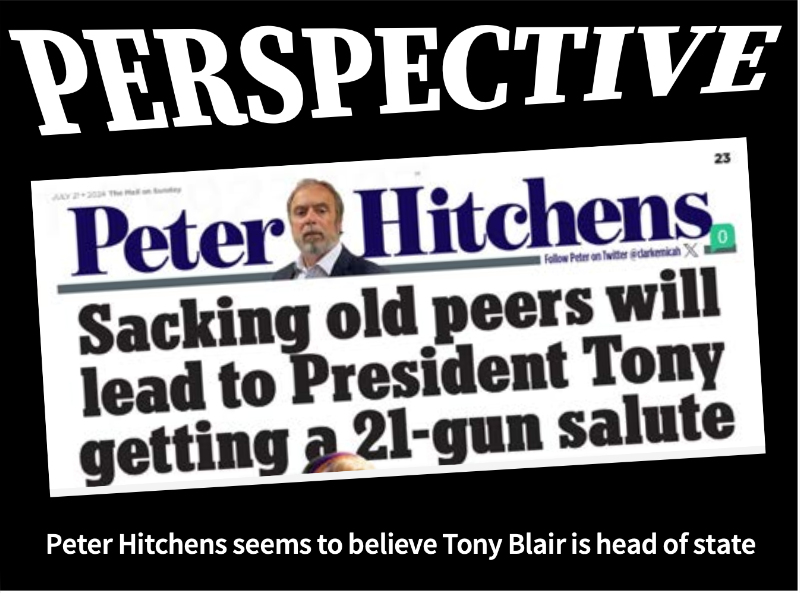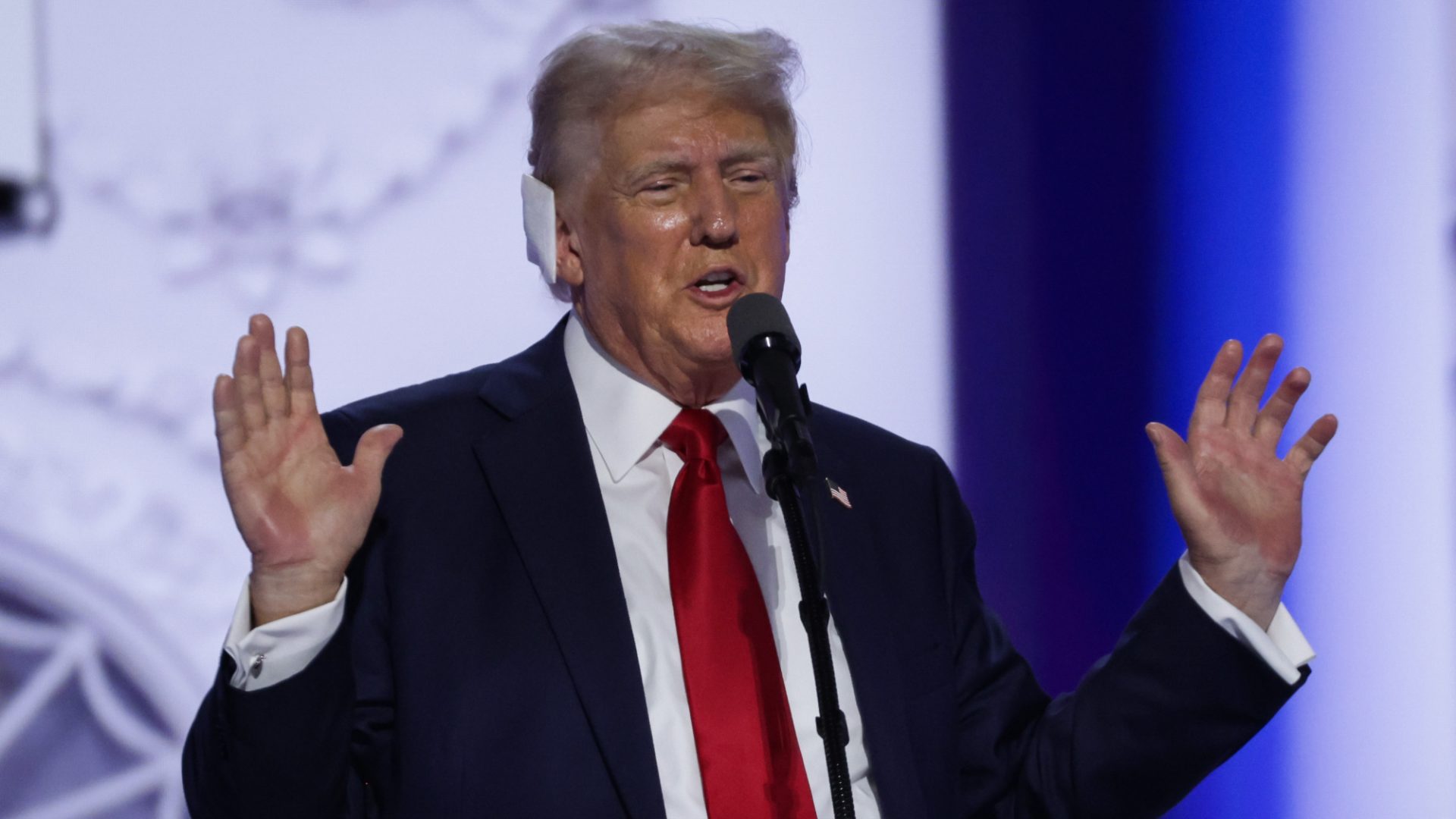In “The bullet hit Trump – but it killed Joe Biden” (TNE #397), Matthew d’Ancona risks falling into the same hyperbolic trap that plagued our media in the run-up to other recent elections. “France is about to get its first far right government” – it didn’t. “Reform will be the next party of opposition” – it isn’t.
Whoever runs for the Democrats NOW, the war of Trump’s ear has not resulted in the anticipated huge bounce in the polls for Republicans. Moreover, Trump’s selection of a white male running mate with attitudes that pre-date Noah has further alienated and galvanised black and female voters.
November is a considerable time away. In the end, as in all elections, the outcome will be decided by actual votes cast on the day.
Carol Hedges
Harpenden, Herts
All of a sudden, from looking like a Trump victory in November there is a competitive election once more. It is no longer about two old men, both clearly losing their mental faculties, with Biden’s more steep decline being reflected in polling.
Kamala Harris represents so many of the issues that have pumped up the Trump base. His campaign will surely double down on those. But his own shortcomings will also be exposed and he no longer has Biden’s obvious problems to hide behind.
The battle for swing voters is on with renewed vigour. This election is transformed.
David Rolfe
Cool Beveridge
Congratulations on your excellent New Beveridge Report (TNE #397), particularly the thoughtful piece by Caroline Lucas. I read it on the day that swingeing sentences were imposed on Extinction Rebellion protesters. Surely these must be reduced, if not reversed?
Camilla Platt
Combating ignorance – otherwise known as “education” – should still have been one of your five key themes. Improved education feeds into addressing all the others, both as a citizen or a “producer/supplier”.
H Hamley
Brexit wounds
“Dodging the cost of Brexit”, Jonty Bloom’s analysis in TNE #397 of the damage wrought to the UK economy (£140bn so far and a further 4% to 6% lost to GDP each year) shows the mammoth size of the financial problem faced by Sir Keir Starmer’s government.
But the headache is not merely a matter of economics. There is a strong feeling among Remainers that such problems are for Leave voters to deal with. Having been deprived of their European citizenship and their freedom of movement, many Remainers do not accept that they should now work unceasingly to tackle the devastation created by leaving the EU.
Indeed, many have become amused spectators, sitting quietly at home sipping their tea, appreciative of the words of Marcus Tullius Cicero, “If you have a garden and a library, you have everything you need.”
Dr Robert Drake
Sketty, Swansea
Let’s stop this nonsense about the EU “not wanting us back”. No key EU figure has said or even hinted this, as it would make no economic or geopolitical sense.
If we start to see core EU growth start to unambiguously outstrip the UK – then I suspect Labour will be forced to drop its Brexit red lines.
This could involve seeking a fresh electoral mandate much sooner than 2029.
Mark Sullivan
One of the dreadful consequences of Brexit was that thousands of doctors, nurses and care workers left the United Kingdom and returned to
the EU countries from whence they came.
Some doctors and nurses have returned to the private sector. Yesterday I was cared for by Dana, a nurse from Poland, when I was treated in a private hospital. She said that quite a number of nurses have returned to Britain, but hardly any to the NHS.
If we were to rejoin the European Union, we would be able to reverse these losses.
David Hogg
Bristol

Gender issues
Alastair Campbell underestimates women’s importance. His dismissal of concerns about Keir Starmer’s inability to say what a woman is (Diary, TNE #397) is based on a miscalculation. 51% of the population is not “a very small percentage”.
Alan Neale
I completely support Alastair Campbell’s call for a detoxification of the trans debate, and the need to support individuals like Milo Kinnock.
But Alastair, don’t you think there is still something to be discussed about avoiding making fundamental changes to the legal definition of a woman and enforcing biological male entry to all female spaces if they’ve changed their gender ID?
Stephen Grainge
Reform acts
Re: James Ball’s “Things can only get bitter” (TNE #397). I look forward to Nigel Farage’s wailing and gnashing of teeth when Starmer outlaws second jobs for MPs and confidently predict Nigel standing down shortly thereafter. After all, he didn’t enter politics in order to curtail his earning potential.
I also look forward to his declarations in the register of members interest and note that travel and hospitality in connection with a member’s political activities is required to be declared (I very much doubt he’ll be spending his own money on his frequent transatlantic trips and his trips are clearly political in nature).
Stuart Shingler
Re: Mandrake on Nigel Farage (TNE #397). No matter who phoned who to organise his appearance, there was a clear case for Farage appearing on the Laura Kuenssberg show to discuss the assassination attempt on Donald Trump. Narcissists love narcissists and hence we must accept that Farage is closer to Trump than most in the UK.
What the BBC and other channels must be wary of is giving Farage undue prominence in normal times, simply because he can be relied upon to say outrageous things. He is the leader of a party with five Commons seats and as such is “owed” slightly more coverage than the Greens, who have four. The post-election balance, even before events in Pennsylvania, has been massively and disproportionately in his favour.
I do not mean Farage should be no-platformed or artificially ignored. I just mean that now he is a party leader in Westminster, he should receive the airtime appropriate and no more.
Sarah Nash
The media want people like Farage because controversial people bring viewers to an otherwise dull news channel. I remember the BNP’s Nick Griffin regularly getting airtime.
This last election showed tactical voting works to keep the far right and right from power.
Deji Fadahunsi
Putting up with Putin
Re: “How Putin lost in France” (TNE #397). The first step in stopping Russian interference in our elections is for our governments to publicise the problem. This hasn’t happened in the UK, because the first major occurrence of Russian interference in UK votes was during the Brexit referendum, and hence the UK government afterwards was on the same side as the Russians, so had no incentive to call them out.
This is why Boris Johnson limited the scope of the Russia report and redacted its findings.
I’d like to see our new government, unencumbered by the embarrassment of having fought on the same side as Vladimir Putin, reinvestigate that interference.
David Roberts
Bottle job
I loved Steve Anglesey’s online piece, “The war against EU tethered bottle caps” (tinyurl.com/TNEcaps). We came across them well before the July 3 implementation date.
Unless you’re especially challenged in the imbibing and pouring departments, they are no problem, and my sources in Germany suggest the idea came from manufacturers in the first place.
The EU operates on the principle of subsidiarity – the EU only acts when there is an actual or potential EU-wide benefit, which is clearly the case here, but that principle is not something we ever hear about.
Maybe the EU could introduce a mandatory training programme for third-country users at the point of entry, ending with a certificate with a detachable authentication tag, without which you can’t buy a plastic drinks bottle? Meanwhile, Brexiteers could pressure the government into refusing to accept non-detachable bottle tops, leading to a UK-wide shortage of bottled water as manufacturers refuse to produce two types of bottle – or would they bottle that?
Let the Express run that one up the flagpole and see who salutes…
Phil Green
Sorry Steve Anglesey, but it is not just right wingers that detest tethered lids. As a lefty Remainer, they are soooo annoying!
Worst are the lids attached to Smoothies that drip over your face if you drink out of the bottle. The best solution is a Swiss Army knife with scissors to cut through the tether. And while on the subject of the Swiss, while living there we were used to squeezing the air out of bottles before putting the lid back on as a requirement of recycling…
Peter Hill
Off the rails
On a recent episode of TNE’s Two Matts podcast (tinyurl.com/TNEMatts), the Matts agreed that British Rail was “shockingly bad”. But this was not always the case.
It was shockingly bad only once Thatcher got into power and BR’s funds were slashed so much that it couldn’t function properly, so the country settled for privatisation. They are doing the same with the NHS now.
Chris Jones
I am old enough to remember British Railways in public ownership. The basic problem was that as the Ministry of Transport battled with all the others for Treasury funding, the railways were not prioritised as vital, received poor levels of investment and thus the dilapidated rolling stock ended up causing delays. Today’s proponents of renationalisation are too young to remember this.
David Forsyth
Voter apathy
Notwithstanding the skewed nature of our First Past The Post electoral system, Chris Fitzpatrick’s suggestion (Letters, TNE #396) of a new dictionary definition of “landslide victory” misses one fundamental point.
Eligible voters who choose not to vote are making a statement by doing so and, whether they like it or not, tacitly accept the election result, whichever way it goes.
By that measure, and because of the particularly low turnout this time, 9.7 million people actively voted for a Labour government and 19.4 million (or 40%) did not oppose it.
Christopher Molloy

BELOW THE LINE
Comments, conversation and correspondence from our online subscribers
Re: Patience Wheatcroft’s “The Conservatives’ long game of thrones begins” (TNE #396). As a constituent of Robert Jenrick, I call out the dishonesty of his blatant leadership pitch in the House debate on the King’s Speech. In that piece of electioneering, he laid claim to being elected on an anti-immigration “centre right” (!) ticket. Yet his campaign in Newark was entirely about local schools, hospitals and potholes.
His eight-page election leaflet mentioned the Conservative Party once – in the footnote to p8, where it legally has to say “printed on behalf of the Conservative Party”.
Tim Smart
Re: Lie of the Week (TNE #397), which reports the GB News host Darren Grimes’ remark “Do you think you can swear on the bible in the parliament of Muslim countries?” and then shows that, of course, you can.
The problem with claims like this is from Grimes is that they don’t have to be true, they just have to be said. Unfortunately, there are enough people out there with an appetite to believe this sort of drivel.
Glenn Macdonald-Jones
The film starring Rosalind Russell as Hildy Johnson (Vintage quiz, TNE #397) was His Girl Friday, which was based on The Front Page.
P Michael
Re: “Barcelona’s water pistol revolution” (TNE #397). Mass tourism arrives in the most part by planes or cruise liners, and not individuals arriving by car or coach. It can be controlled as both ship and plane landings need to be state-sanctioned.
Where tourists stay can also, mostly, be controlled by hotel/apartment/
Airbnb listing and regulation thereof.
In short, it will always be a choice of a state or city whether or not to allow, promote or encourage mass tourism. Barcelona’s decision is in its own hands and perhaps we all need a rethink about tourism’s impact on the climate crisis.
Peter Kidman
In “The man who lived next door to Auschwitz” (TNE #396), the Nazi commandant’s son is told: “There was a fence between the horror and your real life.” This perfectly describes Gaza for the past two decades. And people wonder why they try to break out.
Richard Riddle
JOIN THE CONVERSATION
Subscribe and download our free new app to comment and chat with our writers



